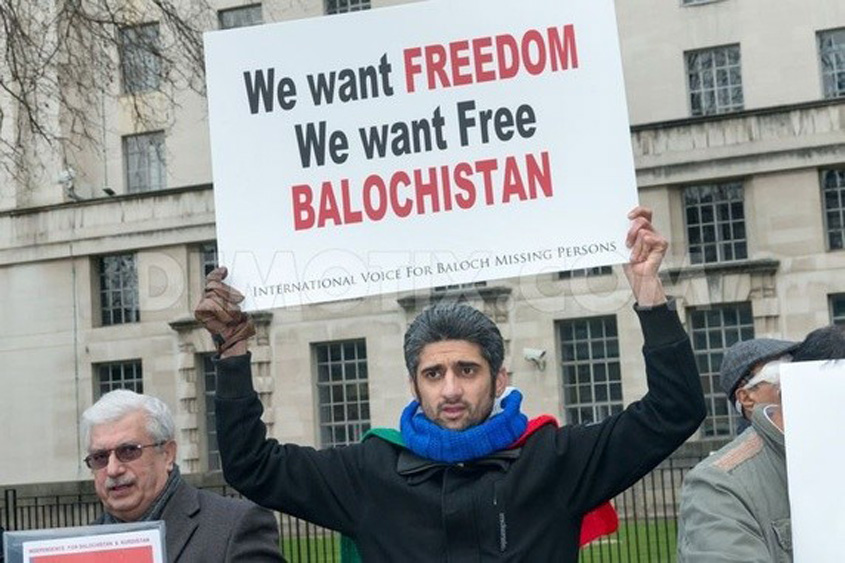While Balochistan has publicly asked for India’s help to fight Pakistan and gain freedom from it, Sindh and Khyber Pakhtunkhwa provinces’ leaders living abroad have also started speaking about Pakistan’s “atrocities” against their people, thus hinting towards an alliance among the three provinces against Pakistan, backed by India.
Umar Daud Khattak, a Pakhtoon born in Karak, Khyber Pakhtunkhwa province of Pakistan, has urged the Indian government to facilitate and support such an alliance to fight Pakistan and said, “For Sindhis, Pakhtoons and Balochs, the real Pakistan only constitutes of Punjabis. The residents of none of the provinces identify themselves as Pakistanis. With India’s support, the separatist leaders of these three provinces will willingly come together. India should help us leave Pakistan.”
On why India should help Pakhtoons, Khattak talked about the extent of geographical dominance that India can practise if it helps the people of Khyber Pakhtunkhwa. “Pakhtoons want a free Pashtunistan, which would include FATA (Federally Administered Tribal Areas), Khyber Pankhtunkhwa (KP) and the part of KP which was earlier annexed by Pakistan. There are about 15 million Pakhtoons in FATA, who would willingly take on the Pakistan army any day, if India helps them. These Pakhtoons in FATA are united by their disgust for Pakistan because Pakistan made FATA its military backyard. Helping Pakhtoons to fight Pakistan in FATA can give India geographical advantage and impair Pakistan’s various extremist units’ operations,” Khattak said.
Another major reason why India should help Pakhtoons, according to Khattak, is, “There are a significant number of Pakhtoons in the Pakistan army. If they know that India is supporting the liberation of KP from Pakistan, they will defect from the army. Pakistan’s militants who have ruined Kashmir have also been trained in FATA. Helping FATA would mean helping Kashmir.”
Sindhi separatist leaders who have been living in exile, too, welcome India’s help in such an alliance, but prefer to talk about it in hushed tones. Shafi Mohammad Burfat, a prominent Sindh Nationalist Movement leader, who is living in exile in Germany, said, “Historically, culturally and morally, Sindh is different from Pakistan and closer to India. Neither are we Sindhis religious extremists, nor do we want to be identified as that. Sindhis are Sufi people. The Rig Veda that defines Hinduism, was written in Sindh and with the advent of the Mughals came Islam. Sindh has been a multi-cultural space, but Pakistan has ruined it. My name is Mohammad, but I follow Shivism; that is what we Sindhis are like. India has every reason to help us and save the roots of Hinduism in Sindh.”
Dr Hyder Lashari, chairman of G.M. Sayed Studies Board and a senior political leader from Sindh province of Pakistan, living in New York, explained what unites Sindhis, Balochs and Pakhtoons: “The China-Pakistan Economic Corridor (CPEC) is the immediate concern. It will start from Gwadar port of Balochistan and Karachi port of Sindh and will affect the tribal area of KP. Punjabis want to colonise Gwadar and Sindh, while creating a safe zone in tribal KP. They have also planned to let the Chinese colonise our lands. Three nations are facing genocidal operations from Pakistan, while China is ignoring this fact.”
Dr Lashari said, “Without an alliance of victimised and oppressed nations, it is hard to win freedom from Pakistan’s imperialism. We Sindhis think of Balochs and Pakhtoons as our brothers. Our leader Sain G.M. Sayed, Pakhtoon leader Khan Abdul Ghaffar Khan and Baloch leaders Nawab Khair Baksh Marri and Nawab Akbar Bugti were colleagues, too, who shared similar nationalist interests. We have an unofficial alliance with Balochs and Pakhtoons, but we are planning to do more.”

